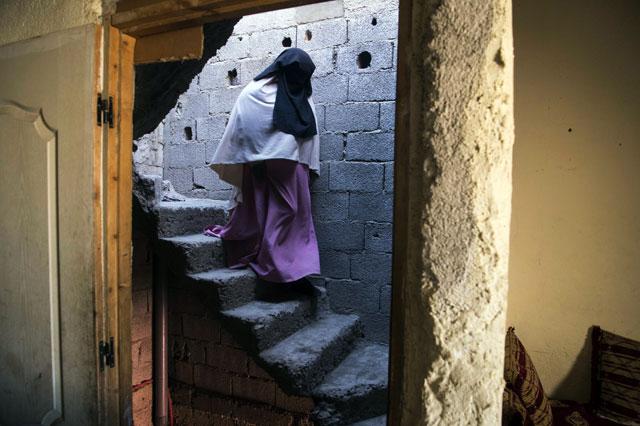You are here
‘Radical’ young men key suspects in Morocco tourist murders
By AFP - Dec 22,2018 - Last updated at Dec 22,2018

Fatima El Khayali, the aunt of Abdelrahim El Khayali, one of the suspects who were arrested following the murder of two Scandinavian hikers in Morocco's High Atlas Mountains, descends the stairs of her house in the neighbourhood of Azzouzia in Marrakesh on Friday (AFP photo)
MARRAKESH, Morocco — One key suspect in the murder of two Scandinavian hikers in Morocco was a plumber and another was a carpenter who enjoyed drinking alcohol before embracing radical Islam, friends and neighbours said.
Abderrahim Khayali, the plumber, was the first to be arrested Monday by Moroccan authorities in the tourist hub of Marrakesh, hours after the bodies of the two women were found in the High Atlas Mountains.
On Thursday authorities said they had also taken into custody Younes Ouaziyad, the carpenter, as well as street vendors Rachid Afatti and Abdessamad Ejjoud — all suspects in a "terrorist act".
The Rabat prosecutor said the four men, aged between 25 and 33, appeared in a video pledging allegiance to the terrorist Daesh group before the grisly murder.
On Friday Moroccan authorities announced nine new arrests over the killing of Danish student Louisa Veserager Jespersen, 24, and 28-year-old Norwegian Maren Ueland.
One of them was beheaded, according to a source close to the investigation.
Khayali's arrest has shocked friends and relatives in Al Azzouzia, an impoverished neighbourhood of Marrakesh.
"I cannot believe it," said his aunt Fatima Khayali, 46, wearing a black niqab veil revealing only her eyes.
The 33-year-old suspect "worked as a plumber for a hotel" but resigned because the establishment served alcohol which is proscribed by strict Islamic practice, she said.
Khayali embraced salafism — a form of radical Islam that has taken root in many impoverished areas of Morocco — three years ago, she said.
After his conversion to salafism he refused to shake hands with women or have them present when men were around, according to a woman who gave her name as Atika and described herself as Khayali's "childhood friend".
Morocco has long been considered among the most liberal of nations in the Arab world, although Islam is the state religion.
Social inequalities
The country, which relies heavily on income from tourism, had been spared terrorist attacks since 2011, when a bomb blast at a cafe in Marrakesh's famed Jamaa El Fna Square killed 17 people, mostly European tourists.
But Morocco is marked by glaring social and economic inequalities, against a backdrop of high unemployment among young people.
Al Azzouzia's unsightly building projects contrast sharply with the opulent palm-tree dotted avenues and luxury hotels of Marrakesh.
Ouaziyad, the 27-year-old carpenter, also lived in the neighbourhood where unemployed young men can be seen loitering in the streets.
He was an "ordinary man", said greengrocer Abdelaati.
Relatives, who declined to be named, said that Ouaziyad became a salafist a little more than a year ago, letting his beard grow and opting to wear the long white qamis tunic that radical Islamists prefer.
"He used to press us to say our [five daily] prayers but before he became a salafist he used to drink alcohol and smoke," said Noureddine, a relative of Ouaziyad who declined to give his full name.
Ouaziyad's father refused to talk to the media about his son's suspected involvement in the murders, saying he was "shattered".
The two other suspects, Affati, 33, and 25-year-old Ejjoud, lived in the impoverished village of Harbil some 20 kilometres away from Marrakesh. Both eked out livings as street vendors.
"People feel shame to see their village linked to this crime," said a resident who declined to be named.
Mohammed Masbah, an expert on Islamist groups, said all four suspects had one thing in common: "They are socially marginalized."
Hassan Khayali, a cousin of the first suspect, agreed.
Places like Al Azzouzia are a "time bomb because of poverty, unemployment, drugs and prostitution", all factors that push disenchanted young men to turn to radical Islam, he said.
Related Articles
SALÉ, Morocco — The trial of the suspected extremist killers of two Scandinavian women hikers beheaded in Morocco's High Atlas mountains nea
SALÉ, MOROCCO — Moroccan prosecutors on Thursday called for the death penalty for the three main extremist suspects on trial for the "b
Salé, Morocco — The trial of 24 men charged over the brutal murder of two Scandinavian hikers resumed on Thursday in Morocco, with













